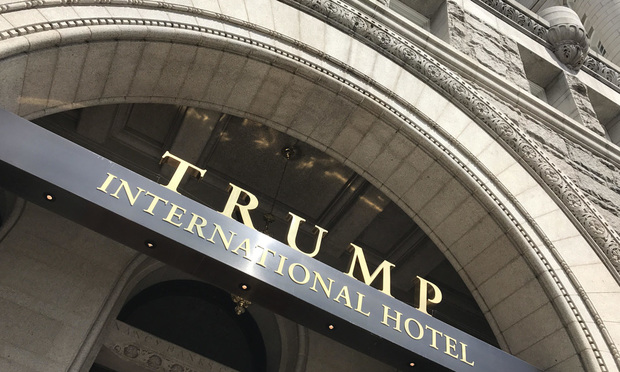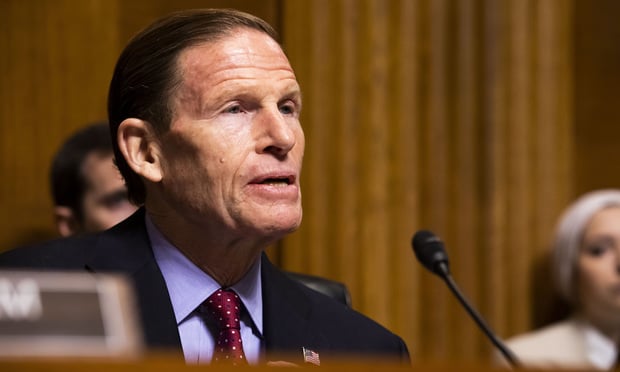Trump Wants DC Circuit to Stop 'Distracting' Emoluments Suit
Justice Department lawyers have lost earlier bids to shut down the lawsuit, filed by U.S. Sen. Richard Blumenthal of Connecticut and other Democratic senators.
July 08, 2019 at 03:22 PM
4 minute read
 Trump International Hotel in D.C. Photo: Michael Scarcella/ALM
Trump International Hotel in D.C. Photo: Michael Scarcella/ALM
U.S. Justice Department lawyers will ask a federal appeals court in Washington to block a lawsuit from Democratic U.S. senators and House members that contends President Donald Trump is violating the U.S. Constitution's prohibition against presidents receiving gifts or payments from foreign states.
Justice Department lawyers have lost earlier bids to shut down the lawsuit, filed in U.S. District Court for the District of Columbia by named plaintiff U.S. Sen. Richard Blumenthal, D-Connecticut, who was joined by more than 200 other senators and members of the House. Government lawyers said Monday they intend to ask the U.S. Court of Appeals for the D.C. Circuit to issue an order pausing the case, or an order directing the trial judge to dismiss the complaint.
“If the district court's clearly erroneous orders are allowed to stand, this improper suit will proceed and the members will commence discovery aimed at probing the president's personal financial affairs because he holds federal office,” Justice Department lawyers said in a court filing. “Indeed, that discovery, the members acknowledge, may be directed at the president himself, 'distract[ing] [him] from the energetic performance of [his] constitutional duties.'”
DOJ lawyers said they will ask the D.C. Circuit to rule by July 22, seven days before third parties—including a number of Trump businesses—are scheduled to respond to subpoenas issued by the plaintiffs.
Justice Department lawyers argued in their court filing Monday that “any information produced through discovery would undoubtedly be publicized and used to distract and harass the president.”
At issue is U.S. District Judge Emmet Sullivan's ruling April 30 that said the lawmakers' complaint can proceed. Sullivan refused to dismiss claims that confront Trump's continued receipt of revenue from his private business holdings, including his hotel in downtown Washington. Last month, Sullivan, denying Trump's push to pause the proceedings, said evidence-gathering could begin June 28.
“This tremendous victory assures that President Trump will be held accountable to the Constitution and the American people—a historic triumph for legally mandated transparency,” Blumenthal said in a statement in June. “In a thoughtful, well-reasoned opinion, Judge Sullivan articulated what the law makes clear: there is absolutely no reason to delay one more day in ensuring that President Trump is held accountable for his violation of the Constitution's preeminent anti-corruption provision.”
 Sen. Richard Blumenthal, D-Connecticut. Credit: Diego M. Radzinschi / NLJ
Sen. Richard Blumenthal, D-Connecticut. Credit: Diego M. Radzinschi / NLJThe civil suit in Washington's federal trial court is one of several that contends Trump has violated the Constitution's “emoluments” clause, an anti-graft provision that forbids a U.S. president from profiting from public office. A federal appeals court in Richmond, Virginia, is weighing a similar push from the Justice Department to stop an emoluments suit from Maryland's federal trial court. The appeals court heard arguments in March.
The emoluments litigation is separate from other efforts, led by U.S. House Democrats, to force the Treasury Department and IRS to comply with the terms of a subpoena seeking copies of Trump's tax returns.
Trump also is fighting subpoenas, from various House committees, that seek financial-related information from his longtime accounting firm Mazars USA and from Deutsche Bank and Capital One. A D.C. Circuit panel on Friday—Judges Patricia Millett, David Tatel and Neomi Rao—will hear the Mazars case.
The U.S. Court of Appeals for the Second Circuit has set Aug. 23 to hear Trump's effort to block subpoenas issued to Deutsche Bank and Capital One.
The Justice Department's emoluments filing is posted below:
Read more:
DC Circuit Judges Rao, Millett and Tatel Will Hear Trump Subpoena Case July 12
READ: US House Asks Judge to Force Disclosure of Trump's Taxes
Trump's 'Character and Fitness' Is Questioned in Hotel Liquor-License Case
2 Amicus Briefs Played Big Roles in Latest 'Emoluments' Ruling Against Trump
This content has been archived. It is available through our partners, LexisNexis® and Bloomberg Law.
To view this content, please continue to their sites.
Not a Lexis Subscriber?
Subscribe Now
Not a Bloomberg Law Subscriber?
Subscribe Now
NOT FOR REPRINT
© 2025 ALM Global, LLC, All Rights Reserved. Request academic re-use from www.copyright.com. All other uses, submit a request to [email protected]. For more information visit Asset & Logo Licensing.
You Might Like
View All
US Judge Cannon Blocks DOJ From Releasing Final Report in Trump Documents Probe
3 minute read
Private Equity Giant KKR Refiles SDNY Countersuit in DOJ Premerger Filing Row
3 minute read
Several Big Law Firms Saw Year-Over-Year Lobbying Revenue Growth in 2024
4 minute readTrending Stories
- 1'Didn't Notice Patient Wasn't Breathing': $13.7M Verdict Against Anesthesiologists
- 2'Astronomical' Interest Rates: $1B Settlement to Resolve Allegations of 'Predatory' Lending Cancels $534M in Small-Business Debts
- 3Senator Plans to Reintroduce Bill to Split 9th Circuit
- 4Law Firms Converge to Defend HIPAA Regulation
- 5Judge Denies Retrial Bid by Ex-U.S. Sen. Menendez Over Evidentiary Error
Who Got The Work
J. Brugh Lower of Gibbons has entered an appearance for industrial equipment supplier Devco Corporation in a pending trademark infringement lawsuit. The suit, accusing the defendant of selling knock-off Graco products, was filed Dec. 18 in New Jersey District Court by Rivkin Radler on behalf of Graco Inc. and Graco Minnesota. The case, assigned to U.S. District Judge Zahid N. Quraishi, is 3:24-cv-11294, Graco Inc. et al v. Devco Corporation.
Who Got The Work
Rebecca Maller-Stein and Kent A. Yalowitz of Arnold & Porter Kaye Scholer have entered their appearances for Hanaco Venture Capital and its executives, Lior Prosor and David Frankel, in a pending securities lawsuit. The action, filed on Dec. 24 in New York Southern District Court by Zell, Aron & Co. on behalf of Goldeneye Advisors, accuses the defendants of negligently and fraudulently managing the plaintiff's $1 million investment. The case, assigned to U.S. District Judge Vernon S. Broderick, is 1:24-cv-09918, Goldeneye Advisors, LLC v. Hanaco Venture Capital, Ltd. et al.
Who Got The Work
Attorneys from A&O Shearman has stepped in as defense counsel for Toronto-Dominion Bank and other defendants in a pending securities class action. The suit, filed Dec. 11 in New York Southern District Court by Bleichmar Fonti & Auld, accuses the defendants of concealing the bank's 'pervasive' deficiencies in regards to its compliance with the Bank Secrecy Act and the quality of its anti-money laundering controls. The case, assigned to U.S. District Judge Arun Subramanian, is 1:24-cv-09445, Gonzalez v. The Toronto-Dominion Bank et al.
Who Got The Work
Crown Castle International, a Pennsylvania company providing shared communications infrastructure, has turned to Luke D. Wolf of Gordon Rees Scully Mansukhani to fend off a pending breach-of-contract lawsuit. The court action, filed Nov. 25 in Michigan Eastern District Court by Hooper Hathaway PC on behalf of The Town Residences LLC, accuses Crown Castle of failing to transfer approximately $30,000 in utility payments from T-Mobile in breach of a roof-top lease and assignment agreement. The case, assigned to U.S. District Judge Susan K. Declercq, is 2:24-cv-13131, The Town Residences LLC v. T-Mobile US, Inc. et al.
Who Got The Work
Wilfred P. Coronato and Daniel M. Schwartz of McCarter & English have stepped in as defense counsel to Electrolux Home Products Inc. in a pending product liability lawsuit. The court action, filed Nov. 26 in New York Eastern District Court by Poulos Lopiccolo PC and Nagel Rice LLP on behalf of David Stern, alleges that the defendant's refrigerators’ drawers and shelving repeatedly break and fall apart within months after purchase. The case, assigned to U.S. District Judge Joan M. Azrack, is 2:24-cv-08204, Stern v. Electrolux Home Products, Inc.
Featured Firms
Law Offices of Gary Martin Hays & Associates, P.C.
(470) 294-1674
Law Offices of Mark E. Salomone
(857) 444-6468
Smith & Hassler
(713) 739-1250











